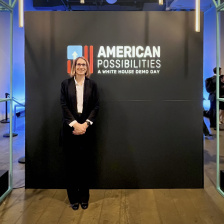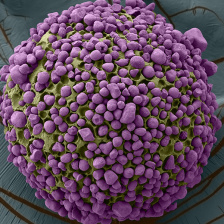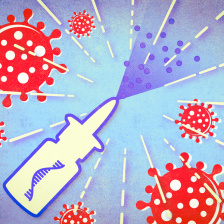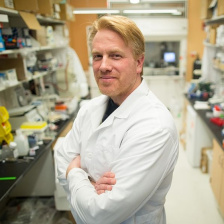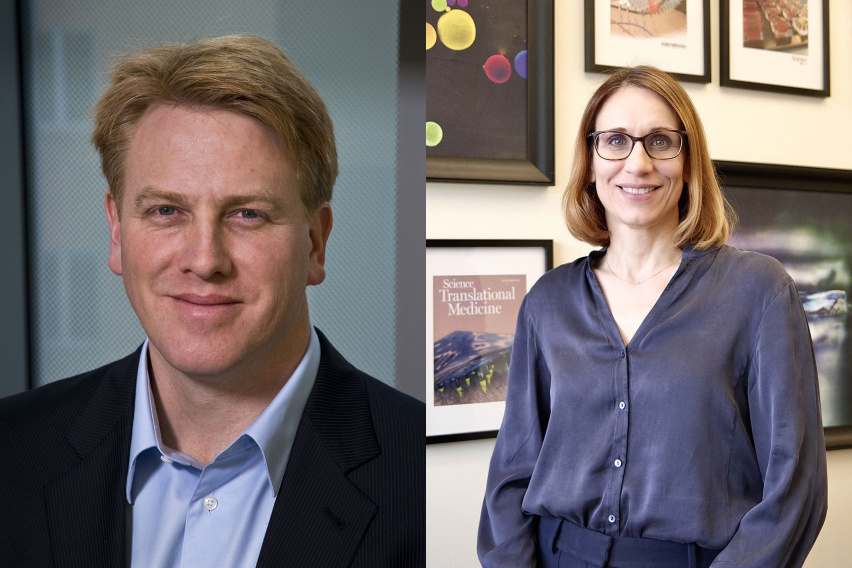
Dan Anderson (left) and Ana Jaklenec
MIT Koch Institute
December 12, 2023
The National Academy of Inventors (NAI) announced the election of more than 160 people to their 2023 class of fellows, including two members of the MIT Koch Institute for Integrative Cancer Research, Daniel Anderson and Ana Jaklenec.
The highest professional distinction accorded solely to academic inventors, election to the NAI recognizes individuals who have created or facilitated outstanding inventions that have made a tangible impact on quality of life, economic development and the welfare of society.
“Daniel and Ana embody some of the Koch Institute’s core values of interdisciplinary innovation and drive to translate their discoveries into real impact for patients,” said Matthew Vander Heiden, director of the Koch Institute. “Their election to the academy is very well-deserved, and we are honored to count them both among the Koch Institute’s and MIT’s research community.”
Daniel G. Anderson is the Joseph R. Mares (1924) Professor of Chemical Engineering, and a core member of the Institute for Medical Engineering and Science. He is a leading researcher in the fields of nanotherapeutics and biomaterials. Anderson’s work has led to advances in a range of areas, including medical devices, cell therapy, drug delivery, gene therapy and material science, and has resulted in the publication of more than 500 papers, patents, and patent applications. He has founded several companies, including Living Proof, Olivo Labs, Crispr Therapeutics (CRSP), Sigilon Therapeutics, Verseau Therapeutics, oRNA, and VasoRx. He is a member of National Academy of Medicine, the Harvard-MIT Division of Health Science and Technology, and is an affiliate of the Broad and Ragon Institutes.
Ana Jaklenec, a principal research scientist and principal investigator at the Koch Institute is a leader in the fields of bioengineering and materials science, focused on controlled delivery and stability of therapeutics for global health. She is an inventor of several drug delivery technologies that have the potential to enable equitable access to medical care globally. Her lab is developing new manufacturing techniques for the design of materials at the nano- and micro-scale for self-boosting vaccines, 3D printed on-demand microneedles, heat stable polymer-based carriers for oral delivery of micronutrients and probiotics, and long-term drug delivery systems for cancer immunotherapy. She has published over 100 manuscripts, patents and patent applications and has founded three companies, Particles for Humanity, VitaKey and OmniPulse Biosciences.
Since its inception in 2012, the NAI Fellows program has grown to include 1,898 exceptional researchers and innovators, who hold over 63,000 U.S. patents and 13,000 licensed technologies. NAI Fellows are known for the societal and economic impact of their inventions, contributing to major advancements in science and consumer technologies. Their innovations have generated over $3 trillion in revenue and generated 1 million jobs.
“This year’s class of NAI Fellows showcases the caliber of researchers that are found within the innovation ecosystem. Each of these individuals are making significant contributions to both science and society through their work,” said Paul R. Sanberg, President of the NAI. “This new class, in conjunction with our existing Fellows, are creating innovations that are driving crucial advancements across a variety of disciplines and are stimulating the global and national economy in immeasurable ways as they move these technologies from lab to marketplace.”
